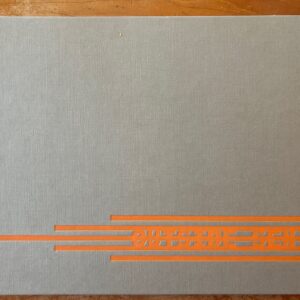JTF (just the facts): A total of nine works, one made in 2018 and eight made this year, installed on white walls in the gallery’s front gallery and small side gallery, as follows: seven archival pigment prints on Lusterboard, and two inkjet prints on cellulose sponge. Each of the prints has a graphite sculpture mounted to its surface. The works range in size from 37 1/2 x 50 inches to 66 x 52 x 7 1/2 inches. (Installation views below.)
Comments/Context: London-born, New York-based artist Adam McEwen’s first solo show at Petzel in 2016 was one of the standout exhibitions in New York that year. By then McEwen had already gained attention for his fake obituaries of living people (he once had a job writing death notices for London’s Daily Telegraph) and was making machined graphite replicas of mundane objects, as well as photographs printed on cellulose (the stuff used to make kitchen sponges) of, among other things, stretch limos and chewing-gum blotched sidewalks.
In the 2016 show, graphite sculptures of supercomputers and airport security bins joined eerie photographs on cellulose depicting the deserted interiors of the four tunnels—Lincoln, Holland, Battery, and Midtown—leading in and out of Manhattan. Also included in the exhibition were a steel replica of an old-fashioned Fox police lock, once a common sight in New York apartments, and a staircase leading nowhere. Taken together, the works suggested both movement and the obstacles to egress and ingress represented by border checks, terrorist acts, and internet firewalls.
As Andy Warhol was, McEwen is interested in death and disaster. But though he shares, to some degree, Warhol’s Pop sensibility, he has in common with certain artists who came to prominence in the 1980s (a number of whom, including Jeff Koons and Richard Prince, not coincidentally featured in McEwen’s obituaries) a general preference for the banal over the sensational. (Though an early work featured a famous news photograph of Mussolini and his wife after they were killed by a mob.)
McEwen’s current show at Petzel is a more modest, if somewhat more fraught outing than his 2016 debut, but it likewise takes interruption and foreclosure—this time perceptual—as its themes. In each of the works here, a 1:1 scale graphite sculpture of a quotidian object such as a hotel door handle with key card slot, a thermostat, a blade for a table saw—useful if it works; the cause of irritation, panic, or injury if it does not—is mounted on an enlarged photographic image.
In seven of the nine works, photograph and sculpture depict the same object. Laid flat to the photographs’ surfaces, the monochromatic sculptures resemble painted silhouettes when seen head on. Conversely, the photographs of these items in situ—a rubber door stop on a paint-splattered floor, say, or restaurant tip tray resting on a printed scarf—are printed as off-register color separations, mimicking the look of those three-dimensional images that pop into focus when the viewer puts on special glasses. (One of the pieces features just such a pair of glasses, whose ghostly graphite double appears in the lower right-hand of the photograph like a painted glyph.)
The other two works feature graphite reproductions of, respectively, an industrial toilet paper dispenser and a swimming pool ladder, mounted on what look like uniformly colored panels of cellulose. But even here, the tension between object and printed image persists, since it seems possible—though it is hard to tell—that the shadows cast by the objects onto their cellulose supports were not real, but printed.
The exhibition shows the artist investigating, in more direct ways than in the past, the act of seeing as both a visual and mental process. The most fascinating aspect of this new body of work is that the confusions between idealized form and uncertain reality, and between projected image and physical presence, enacted by these uncomfortable objects largely disappears when the pieces are reproduced in print or online. Their illuminating awkwardness can only be truly experienced in person.
Collector’s POV: The works in this show are priced at $60000 each. McEwen’s photographic works have only been intermittently available in the secondary markets in recent years, almost entirely offered in Contemporary Art sales. Prices have ranged between roughly $10000 and $112000.




















I would have loved to see a Wayne Thiebaud cupcake painting placed in the middle of this show.